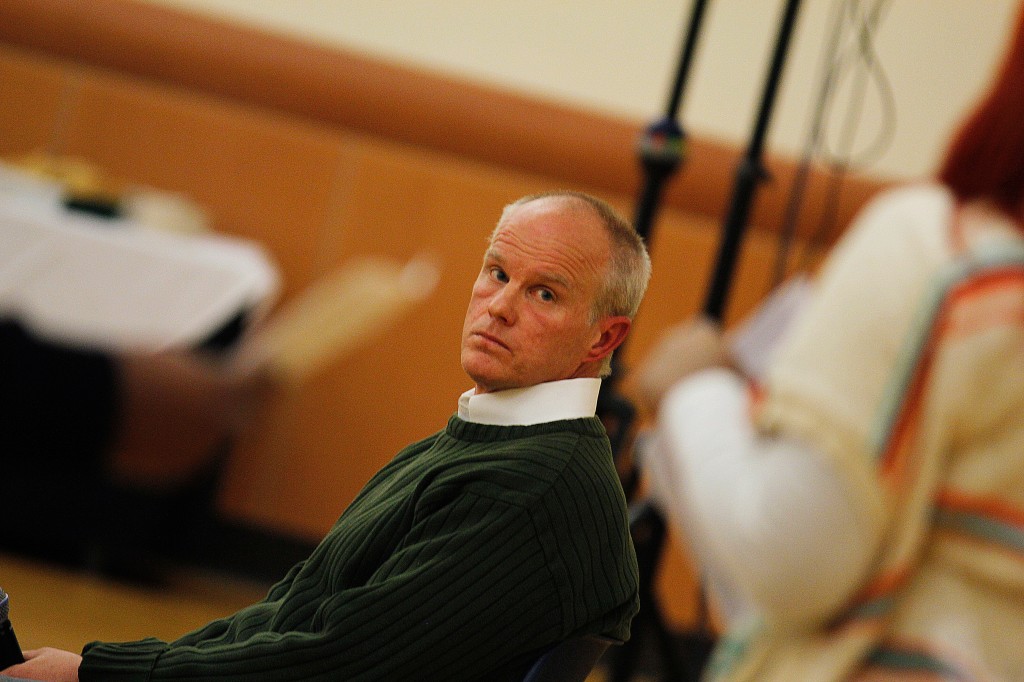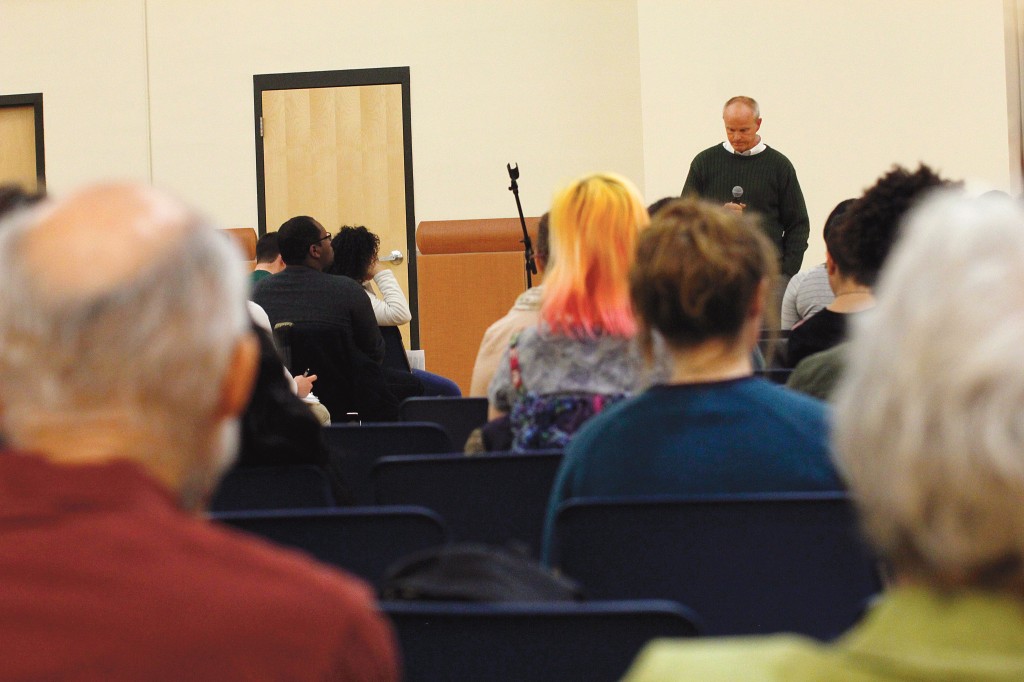
Tensions between Students for Change and the administration came to a head Wednesday evening when Binghamton University President Harvey Stenger dropped his microphone and walked out of the Mandela Room after two hours of answering campus members’ questions.
Students for Change, a campus group whose mission is to fight discrimination at Binghamton University, organized the open town hall meeting with Stenger to address the list of demands that members presented to Provost Donald Nieman in late December.
The group was created in the wake of campus protests about the non-indictments of police officers who killed Eric Garner and Michael Brown, but sought to push for further campus reform that would better protect minority members of the University and increase diversity across the school.
Members of the group had been meeting with administrators for months, but after saying they sensed little urgency from those with whom they met, they sought to address the president personally.
After several weeks of protests and negotiations, organizers and administrators agreed on a time and place. From the start, Stenger was apologetic.
“This is the hardest day of my time in Binghamton,” Stenger said. “I feel personally responsible for these things. I want what you want. I want equality, I want diversity, I want inclusion, I want civility. You ask me to help you. And I’m going to help as much as I can.”
After opening remarks from a few members of Students for Change, the president began with his own opening statement. He then took his place at the front of the room to answer any and all questions that the more than 100 students, faculty and administrators in attendance had for him.
Attendees asked him how he would respond to racist epithets on campus, how he would restrain the University Police Department and what specific actions he would take to protect minority students if threatened.
Some students specifically asked about banning the social media site Yik Yak on campus, and asked if he would formally commit to a “zero-tolerance policy” for racism that would mirror the policy toward plagiarism. Other suggestions included loosening restrictions for hiring faculty, finding a way to involve student organizations more and stopping University police officers from regularly carrying firearms while on patrol.
Multiple students brought up the recent incident at the University of Oklahoma where a group of fraternity brothers was videotaped chanting a racist song on a bus. One asked Stenger if he would have the same response as that university’s president and expel and suspend the students involved.
Stenger said that he personally was disgusted by threatening epithets and has publicly spoken out against them on several occasions, but added that he would defer judgment and punishment to the student conduct process.
“I can — maybe once — override governance,” he explained. “But if I ignore governance, I won’t be president for very long.”
On numerous occasions, the president simply responded to questions with “I don’t know,” instead opting to call on attendees to offer guidance and work with him to improve the University.
Stenger also said that he and his staff were working hard on the 21 current demands submitted by Students for Change, but declined to offer any concrete dates to demonstrate progress on them.
He asked attendees to be patient with the process and accept certain suggestions from the BU administration.
“To wait for this kind of a meeting to occur for each one of the demands — we won’t get there,” Stenger said. “We need to break them all into smaller pieces and attack them, knowing that we’re not doing that just to slow you down, just to throw stuff in your way. We’re doing it because we really do think that’s the way change will happen. ”
A major point of contention during the event was over the role of the Office of Diversity, Equity and Inclusion (ODEI) and its administrators. Students and faculty both questioned the qualifications of Valerie Hampton, the chief diversity officer.
Attendees and organizers claimed that members of the office, specifically Hampton, were unhelpful and at times even condescending and hostile about their concerns. Stenger defended the office by pointing out that it has only been around for one year, and that it is still evolving to better serve campus.
He stated several times that he was “confident” in both Hampton’s abilities and his choice to put her in charge, and when pushed about it further by several speakers, referred to it as a “personnel matter.”
Nearly halfway through, Jibri Easter, a senior majoring in English, came to the microphone.
“Do you feel the tension here? Do you feel like it’s a bunch of people here to just jump on you?” Easter asked, to which Stenger said he did not. “I think you should feel that way, in all honesty. Here’s the thing, we’re doing a lot of bashing of you, but we need to be hand-in-hand with you.”
Jordan White, a junior majoring in sociology, told the president that he needed to provide more tangible solutions.
“As students of color in this school we feel uncomfortable and your response makes me even more uncomfortable, because I’m like ‘Damn, if he doesn’t have the answers, who does have the answers?’” asked White.
A standout moment for many in attendance was when Kelvin Santiago, a sociology professor who signed a letter with other faculty members calling for the president to better address the concerns of student activists, reminded Stenger that he used to be a teacher as well. Santiago asked him what he would do if a student took an open-ended exam and turned in answers like “I don’t know” and “I’ll do better next time.”
“I would fail them,” Stenger said.
Geremy Kaplan, a senior majoring in political science, said afterward that he understood the president’s hesitancy to make future commitments, but that his answers were unreasonably vague.
“Obviously he can’t give material, exact answers of what he is going to do, but he needed to ensure people that he is going to do everything in his power, that it was his number one priority and that he was taking them seriously,” Kaplan said. “I think he just took it too personally and he didn’t give that confidence.”
After dozens of questions, one of the organizers, Epiphany Munoz, a sophomore double-majoring in sociology and Africana studies, took the microphone to ask Stenger if he would send a representative to similar meetings to report on the progress of the administration.
And that was the point at which it appeared that the president had had enough of the meeting.
“No,” he said, before dropping the microphone and storming out of the door. “I’m going to even consider whether I want to stay here.”
Stenger’s sudden departure, which occurred 15 minutes after the event was scheduled to end, left many attendees shocked. Tiffany Traille, a member of Students for Change and an undeclared sophomore, said that she felt the president’s decision to leave was disrespectful and that she felt like he had not come to the meeting prepared.
“I think we all recognized that he might not be the person who we need here,” she said. “He seems to be incompetent on the issues.”
Michael West, a professor of sociology and Africana studies, said that he was speechless when Stenger left.
“I was completely taken aback,” he said. “I’m, frankly, scandalized. I really [didn’t] know how to respond to that.”
He said that he believes the president owes the student body an apology and an explanation, and suggested that the president needed more patience.
“When you’re president, there’s a lot of heat you have to take,” West said. “And you have to be able to hold up under fire. You have to be able to withstand pressure. I well appreciate that it may have been draining for him physically, mentally, emotionally, but he broke. He broke this evening. And that is not a good thing.”
Stenger could not be reached for comment after the event, but released a statement Thursday evening saying that he felt it would be best to address the issues at a later date.
“My office and the offices of our Vice Presidents and Deans will continue to work to ensure that our campus continues to be all-inclusive,” he said. “I am asking that we all work together in a respectful manner to move our campus forward.”



